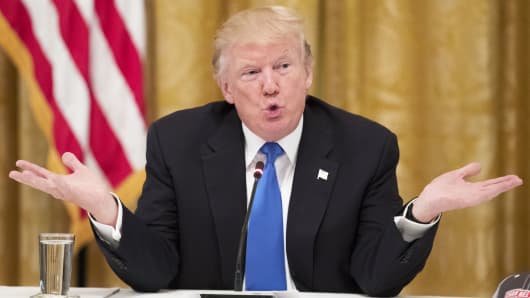President Obama had the broader aim in mind when he distinguished between the end and the means in an address to Congress in 2009 on the need to reform health care: "To my progressive friends, I would remind you that for decades, the driving idea behind reform has been to end insurance company abuses and make coverage affordable for those without it. The public option is only a means to that end – and we should remain open to other ideas that accomplish our ultimate goal."
Democrats today are open to fixing but not to replacing Obamacare. Because the current president nevertheless emphasized repealing and replacing Obamacare as the only way to go, he has himself to blame for the complete lack of Democratic support.
Trump also erred by focusing too much on getting a bill that he could sign and celebrate and not enough on signing a bill that would actually work long after becoming law. Negotiation expert Danny Ertel refers to this as being a "deal-minded" rather than an "implementation-minded" negotiator.
Deal-minded negotiators want above all to get a deal done while implementation-minded negotiators want above all to reach a deal that actually works. Deal-minded negotiators celebrate when they agree to the terms of a merger deal, for example, while implementation-minded negotiators celebrate only when it becomes clear that the merger will work in practice.
If Trump had approached the GOP health-care reform effort as an implementation-minded negotiator then he would have thought harder about whose support he needed, and he would have gotten those parties involved in the process to get both their insights and their buy-in.
But Trump failed to reach out not only to Democrats, doctors and hospitals, but also to holdouts in his own party. On Monday evening the president hosted Republican leaders who were already "yes" votes on health care at the White House for dinner. An implementation-savvy negotiator would have hosted the GOP holdouts instead.
A fourth mistake the president made was to overestimate his ability to force agreement through power and threats. At a lunch Wednesday with 49 GOP Senators at the White House, Trump warned that Dean Heller (R – Nev.) and other Senators who oppose him might lose their reelection bids next year.
But with the president's approval ratings at historic lows such threats have become empty. That sheds light on Marco Rubio's (R – Fla.) comment earlier this week that "… There were plenty of members here who understood the president's preference and were willing to vote against it anyway."
Machiavelli observed that it is best to be loved and feared, "but, because it is difficult to unite them in one person, it is much safer to be feared than loved." The president's problem is that he is increasingly neither loved nor feared.
Followers want leaders who are both competent and caring, but Trump supporters may be experiencing voter's remorse with the growing realization that he is neither. As for competence, what we have seen of his approach to deal-making so far is more artless than artful.
As for caring, it is hard to square many of his actions or lack thereof with a deep concern to deliver what he promised his supporters. Perhaps those supporters will come to see that Tony Schwartz was right when he predicted, in a July 2016 New Yorker interview, that if Trump were elected president "the millions of people who voted for him and believe that he represents their interests will learn what anyone who deals closely with him already knows—that he couldn't care less about them."
Commentary by Joseph Holt, a business ethics professor at the University of Notre Dame's Mendoza College of Business. Follow him on Twitter @busethicsdude.
For more insight from CNBC contributors, follow @CNBCopinion on Twitter.


